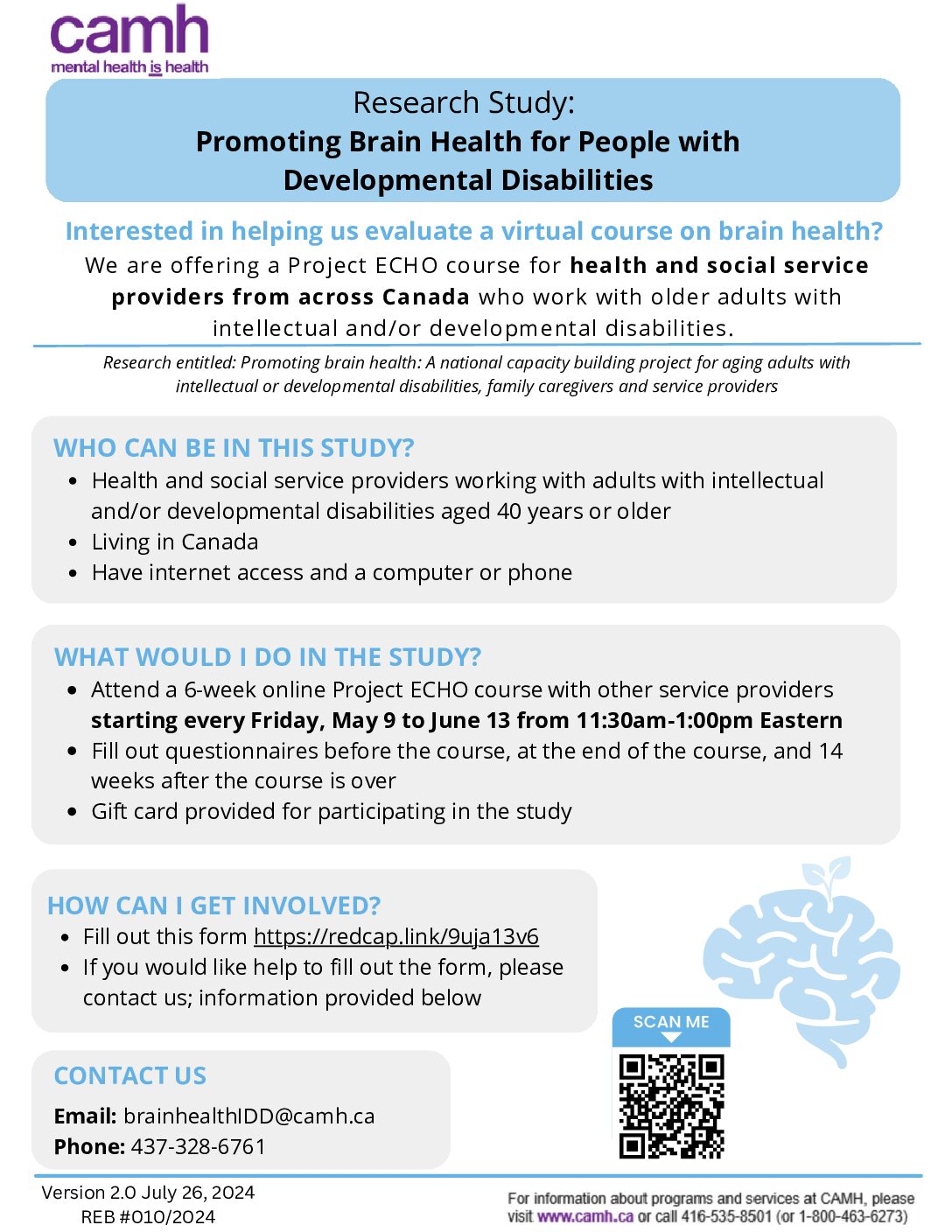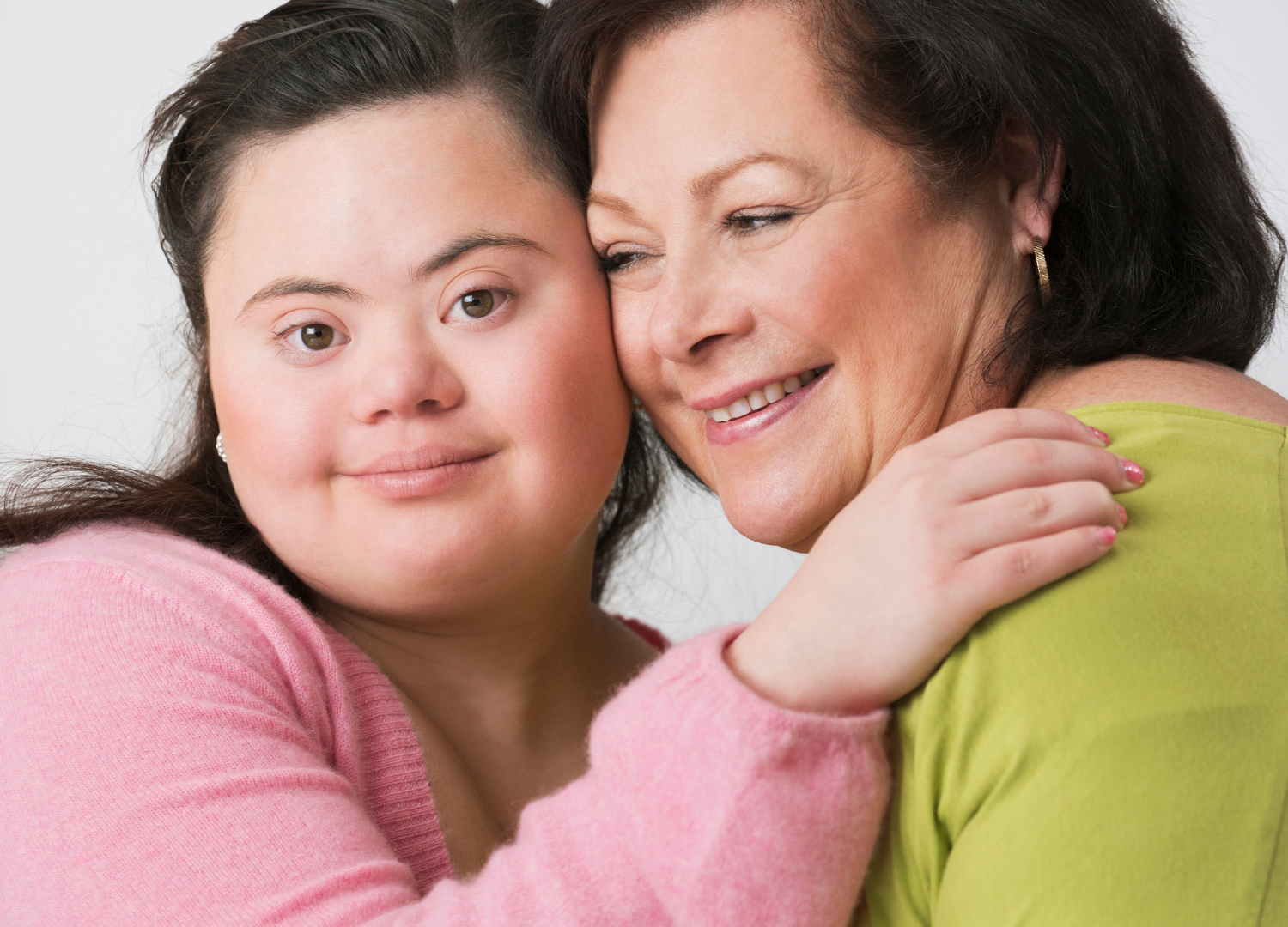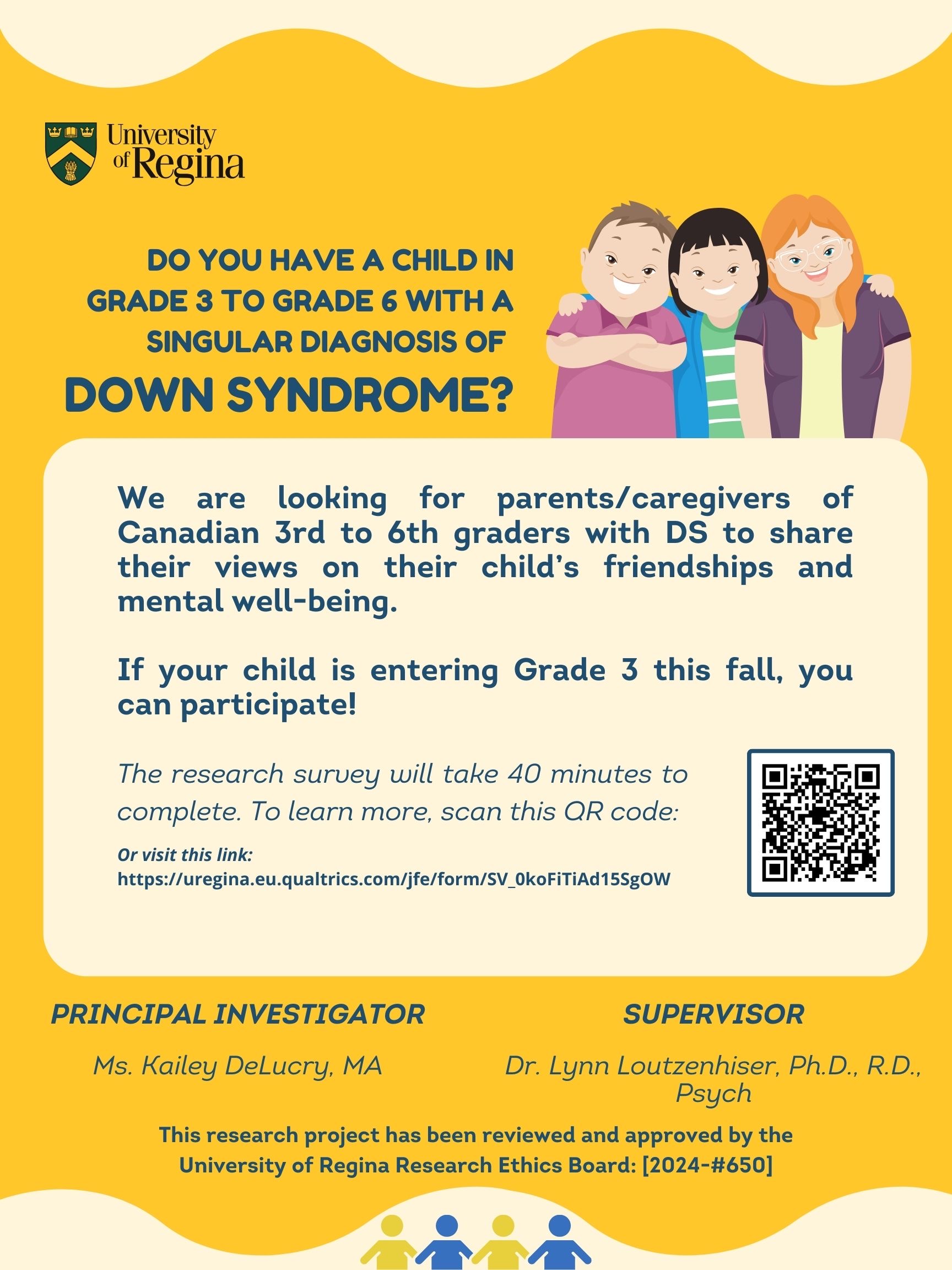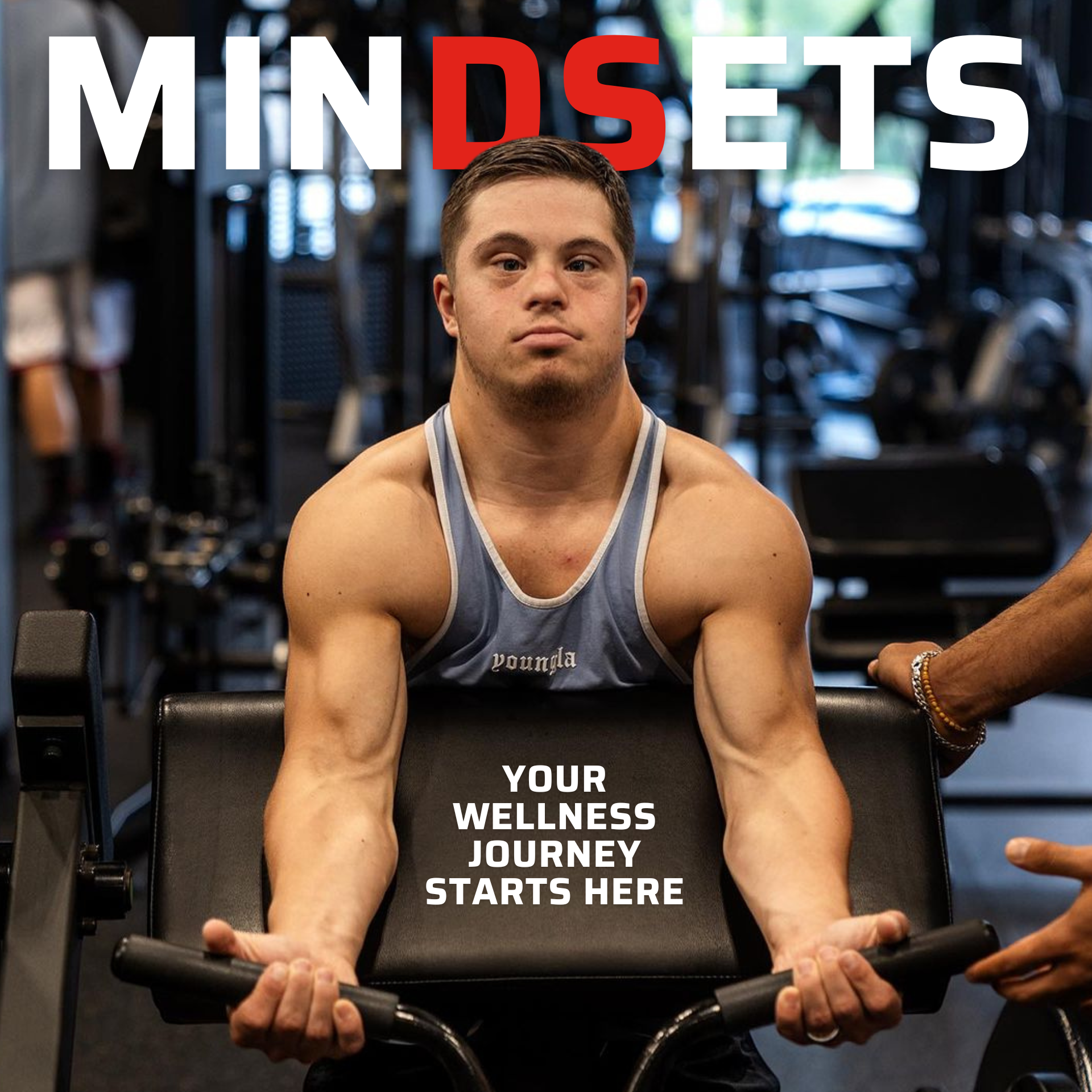Down Syndrome Research
Contribute to Advancing Down Syndrome Research in Canada
There are relatively few research studies dedicated to the Down syndrome community. This leaves a large information gap, which if filled, could mean improved care and support for Canadians with Down syndrome and their families. By participating in research today, you are providing critical information that will inform and guide future programs and advocacy work. Please browse the active studies below and thank you for helping to shape the future of our community.
Active Down Syndrome Research Studies
People with Disabilities as Social Enterprise Enablers (thompson rivers university, Remote)
The Thompson Rivers University Innovation for Social Good cluster is exploring how social entrepreneurship training can benefit individuals with disabilities. They invite participants to engage with a free online social enterprise training program. The program can be completed at your own pace.
- Seeking people with disabilities 18 years of age and older
- Must have internet access and a computer or tablet for online training
- Must be willing to engage with surveys or interviews to evaluate the training.
To participate, complete the consent form linked below.
For more information, please email seability@tru.ca or toluwafemi@tru.ca
VIRTUAl course for service providers on BRAIN HEALTH and aging in adults with IDd (CAMH, Remote)
A group of researchers at the Centre for Addiction and Mental Health (CAMH) is looking to recruit service providers from across Canada working with adults with an intellectual and/or developmental disability (IDD) to take part in a 6-week course and learn how to promote brain health in aging adults with IDD. This course is part of a research study that aims to evaluate the impact of a virtual education program for adults IDD, their families, and service providers from across Canada.
Who Should Attend?
- Health and social service providers working with adults with IDD aged 40 years or older
- Must live in Canada and have internet access and a computer or phone
Dates: Every Friday, May 9 to June 13, 2025 | 11:30am-1:00pm Eastern time
Program Details:
- Attend a 6-week online Project ECHO course with other service providers
- Fill out questionnaires before the course, at the end of the course, and 14 weeks after the course is over
- Receive a gift card at the end of the study for participating
What participants are saying:
“I am so appreciative of the opportunity to be apart of this course and really begin to think even more thoughtfully not just about my clients, but others in my own ecology. It was just good food for thought all around.”
“I gained valuable insights into the unique challenges and needs of individuals in this population, which has enhanced my ability to provide informed support and care.”
To participate, complete the Expression of Interest Form below (available in English and French). For more information, please visit this website or email BrainHealthIDD@camh.ca
EXPLORING PARENT AND CAREGIVER PERSPECTIVES ON FRIENDSHIP AND PSYCHOLOGICAL WELL-BEING AMONG children WITH DOWN SYNDROME (university of regina, Remote)
A PhD candidate at the University of Regina is exploring friendship and psychological well-being in children with Down syndrome. The goal is to better understand the social networks of children with Down syndrome and provide information to develop targeted support to help them build strong social connections early in their school years, which may translate to lifelong friendships/friendship skills.
- Seeking parents and caregivers of children with Down syndrome in Grades 7 to 12 to share their views on their child’s friendships when they were in elementary school.
- Participants will complete an online survey (less than 30 minutes long).
- The survey will collect detailed information about children’s friendships, including the number of friends, time spent with them, and the quality of these friendships. It will also explore the children’s social skills, well-being, and the parents’ own mental health and parenting practices.
Follow the link below to participate in the study.
Arts-Based Digital Knowledge Translation Tools or Parents of Children with Intellectual Developmental Disorders (university of alberta, Remote)
Researchers at the University of Alberta are developing educational resources designed to help parents of children with intellectual developmental disorders (IDD) navigate the uncertainty of emergency department (ED) visits. The study uses art and digital platforms to deliver health information through storytelling, aiming to improve parents’ understanding and reduce anxiety when seeking emergency care for their children.
- Parents of children with IDD are invited to provide feedback to inform the development of these arts-based resources.
- By participating, families will be helping to create resources that will benefit others in similar situation
How to Participate
Parents interested in participating can reach out directly to the research team at echokt@ualberta.ca for more information or to express interest.
This study is funded by the Canadian Institutes of Health Research and has been approved by the University of Alberta Research Ethics Board (Pro00062904).
For questions or more detailed information, please contact:
- Dr. Shannon Scott at Shannon.scott@ualberta.ca or 780-492-1037
- Dr. Lisa Hartling at Hartling@ualberta.ca or 780-492-6124
Physical activity in the down syndrome community (anglia ruskin university, Remote)
Researchers at Anglia Ruskin University, Cambridge, are conducting a study on physical activity and exercise in the Down syndrome community. The study aims to understand how much and what types of physical activity individuals with Down syndrome engage in, as well as the factors that influence participation.
-
Seeking participation from parents or caregivers of individuals with Down syndrome and adults with Down syndrome (18+)
-
Participants will complete an online questionnaire at their convenience:
-
Parents/caregivers survey: Up to 90 questions (approx. 40 minutes, with the option to save progress)
-
Adults with Down syndrome survey: Up to 100 questions (approx. 40 minutes, with the option to save progress)
- Access the surveys by clicking the button below and selecting the ‘Canada’ folder
-
Topics covered include:
-
Physical activity and exercise levels
-
Accessibility of exercise programs
-
Sociodemographic and socioeconomic factors
-
Education access and quality
-
Health status and perceptions
This study has been approved by the Faculty of Science and Engineering Research Ethics Panel at Anglia Ruskin University and complies with GDPR (2018). Results will contribute to academic research and may be presented at conferences or published in peer-reviewed journals. Participants can request a summary of the findings.
For more information or support, please contact Ruby Elizabeth Cain at rc993@pgr.aru.ac.uk
DOWN SYNDROME REGRESSION DISORDER CAREGIVER DISTRESS SURVEY (University OF SOUTHERN CALIFORNIA, Remote)
With help from a medical student at USC, researchers including Dr. Jon Santoro are seeking to better understand the multifaceted impacts of DSRD on caregivers and families. Understanding the extent and nature of caregiver distress in this context is helpful in developing support systems that alleviate caregiver burden and enhance family resilience. In addition, this information will be critical in communicating the need for research on DSRD to organizations like the NIH.
- Participants must be over the age of 18.
- Participants must have a child or a close family member with a possible or probable diagnosis of DSRD.
- Participants should be knowledgeable about the family member’s diagnosis, symptoms, and treatment plan.
- Participants will complete a short online survey that takes approximately 10 minutes.
Follow the link below to participate in the study.
For any questions, please email knchow@usc.edu or dsresearch@chla.usc.edu
EXPLORING PARENT AND CAREGIVER PERSPECTIVES ON FRIENDSHIP AND PSYCHOLOGICAL WELL-BEING AMONG THIRD TO SIXTH GRADERS WITH DOWN SYNDROME (University OF REGINA, Remote)
A PhD candidate at the University of Regina is exploring friendship and psychological well-being in children with Down syndrome in Grades 3 to 6 to determine if this is a particularly critical period in their social development. The goal is to better understand the social networks of children with Down syndrome and provide information to develop targeted support to help them build strong social connections early in their school years, which may translate to lifelong friendships/friendship skills.
- Seeking parents and caregivers of children with Down syndrome in Grades 3 to 6.
- Participants will complete a 40 minute online survey.
- The survey will collect detailed information about children’s friendships, including the number of friends, time spent with them, and the quality of these friendships. It will also explore the children’s social skills, well-being, and the parents’ own mental health and parenting practices.
Follow the link below to participate in the study.
See Research in Action
The Global Mindsets Study was the first of its kind to explore the link between physical activity and cognition in individuals with Down syndrome. Contrary to typical fitness advice for people with Down syndrome, the study showed that regular exercise is not only beneficial but can improve cognitive abilities.
The results were publicly released in October 2023 and are now the foundation of the Mindsets Wellness Program. This new program is designed to help individuals with Down syndrome build healthy habits, providing the same opportunities to benefit from an active, healthy lifestyle as anyone else. Mindsets focuses on education and routine building in three main areas of wellness: fitness, nutrition, and self-care. You can currently preregister for the Mindsets Wellness Program, coming in 2024.
Resources for Every Stage of Life
Looking for already available Down syndrome research? You can find CDSS publications for each stage of life and recommended third-party research and resources in the library below.



















